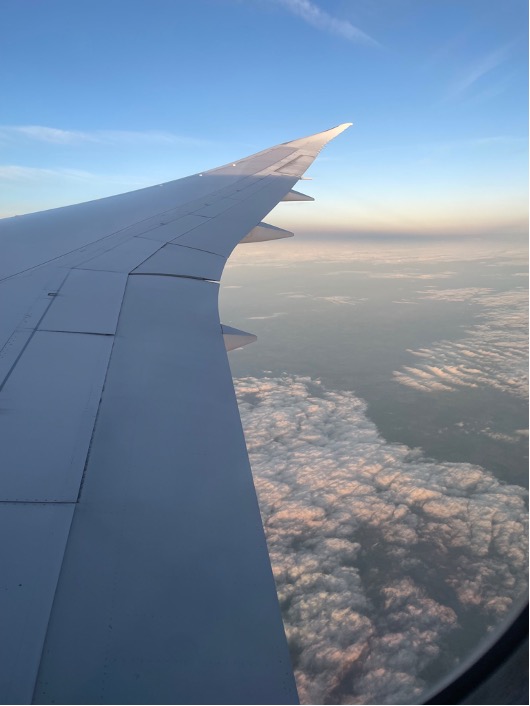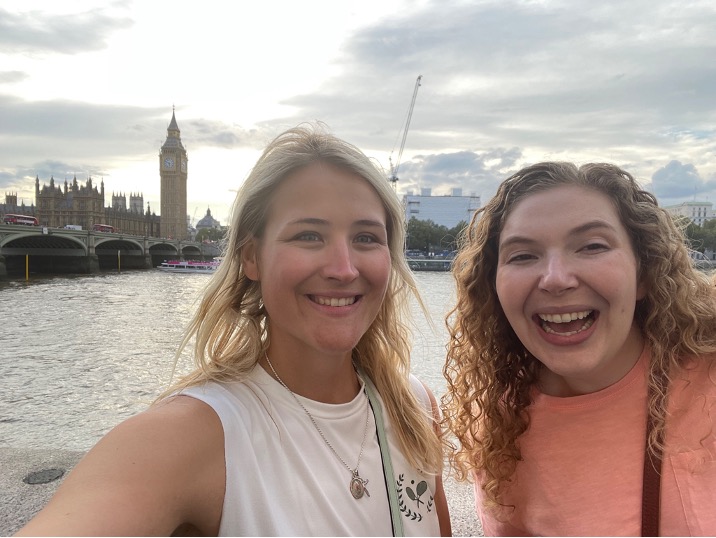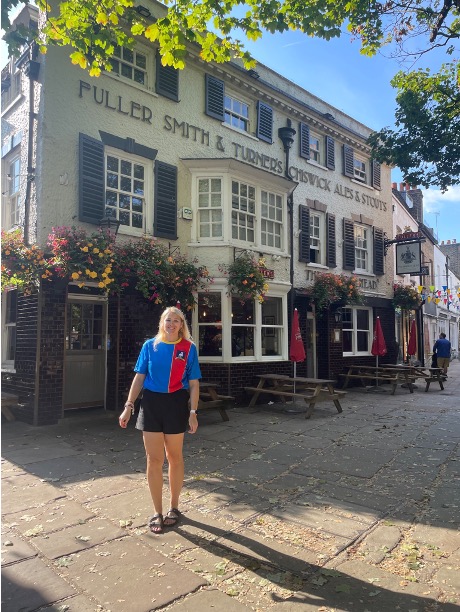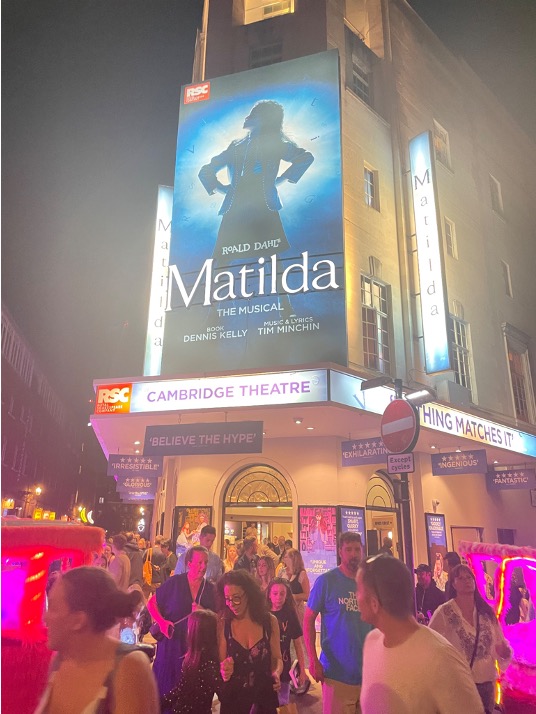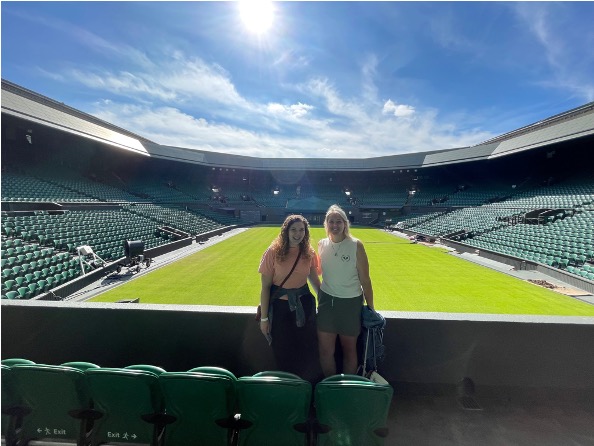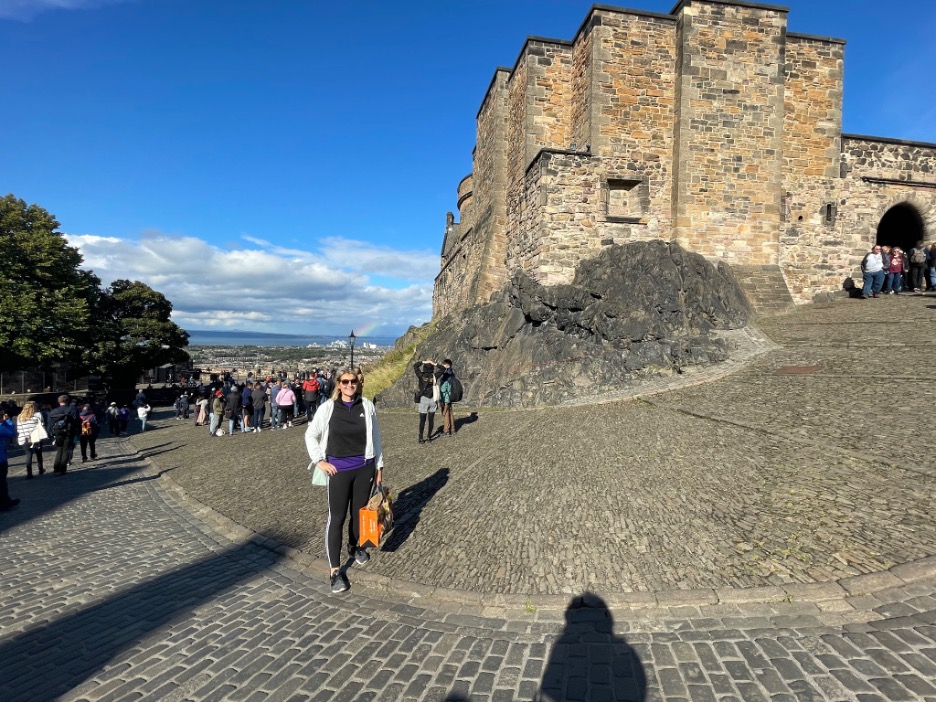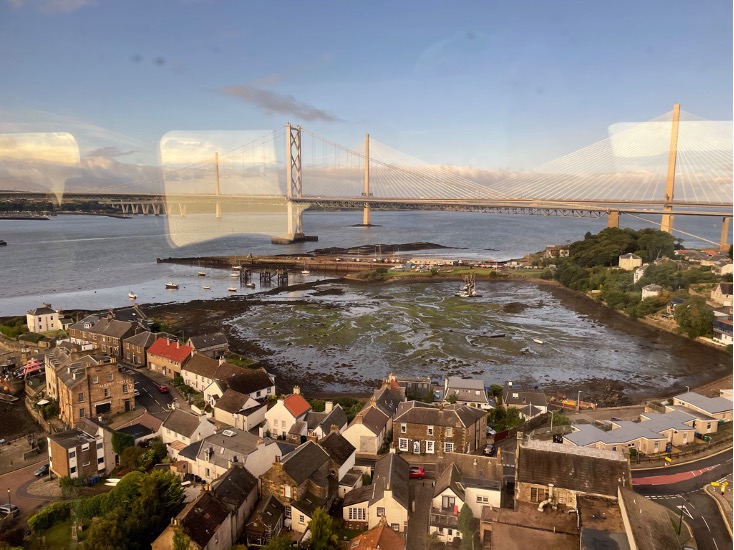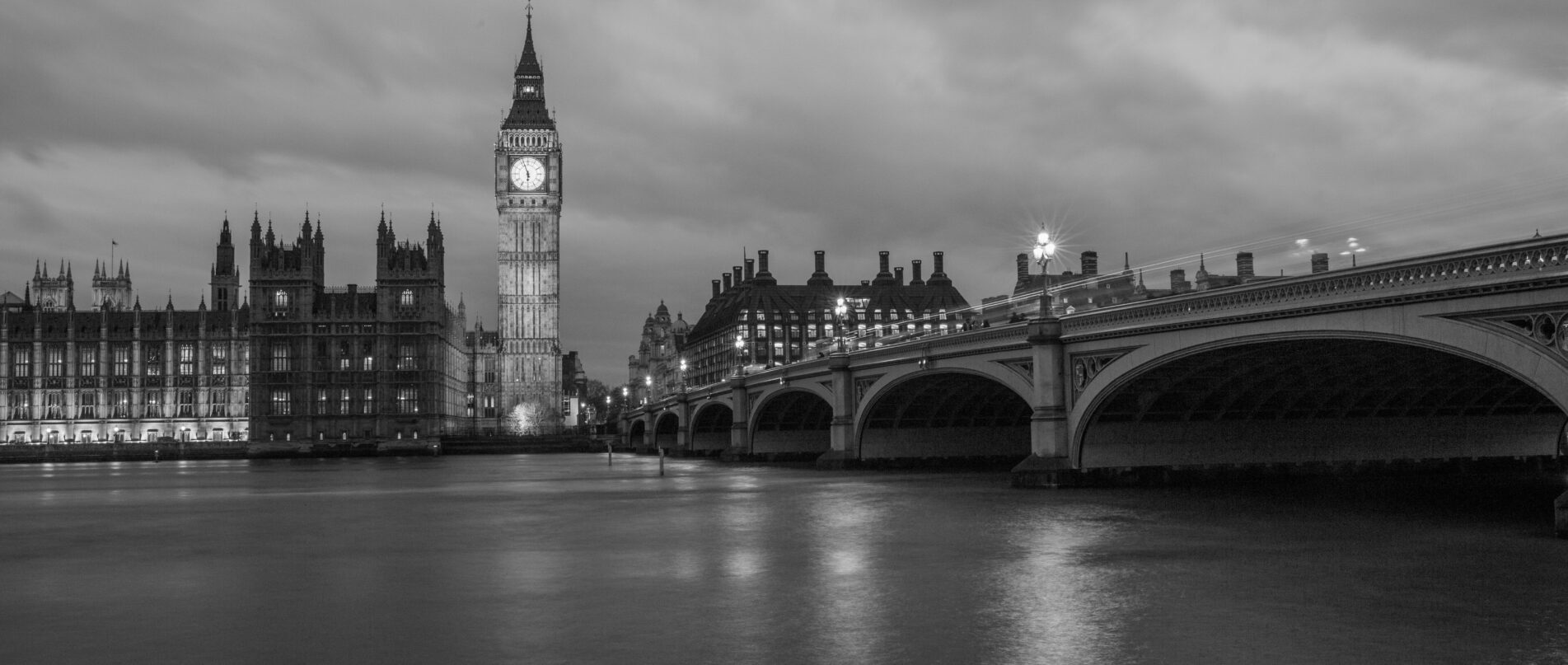
Prompt Images
When I last went to London in 2019, I promised myself that if I ever had the opportunity to go again, it would be different. That year, I was struggling with my health, especially my mental health. Anxiety overwhelmed me, and even when I was with friends I hadn’t seen in years, traveling through a beautiful country, it was almost always top of mind, dictating my decisions, telling me to turn inwards and shut down, rather than bask in the moment.
Earlier this year, while planning my return to England, I told myself I would be better.
It’s what I had worked on for the past four years. I knew how to manage my mental health, and I hoped that the excitement I felt in the lead up would tame any nervousness that came in the midst of the trip. I was a different version of myself, and I would make the most of every moment.
But, as I made my way to O’Hare this past September to board my plane to London, my mental state had hit a new low. My body was rife with anxiety, muscles tense, chest tight, tears leaking out of the corners of my eyes. I’ve always had travel anxiety, but that did not account for the level of terror I felt at the thought of flying, of going to another country. To save me airport parking costs, my parents kindly drove me, and as I hugged them goodbye, my brain shouted over and over “this could be the last time you see them” like it had been on for the past few weeks.
My parents told me I would be okay—everyone did—but I had lost faith in words and the world.
Less than a month earlier, my sister Jenna had passed away unexpectedly from an accidental overdose. It didn’t matter that she had suffered from the disease of addiction for more than 10 years, or that in her periods of use, we had tried to prepare ourselves for this end. Everything I felt I knew about life had been upended—my purpose and path unknowable. I didn’t trust the world to allow me to return home in one piece or to keep my parents from mourning another daughter. Nothing felt safe anymore. So many things I looked forward to felt pointless.
I panicked at the thought of getting on a plane and giving over control to someone I didn’t even know. Multiple times, I considered calling the friend I was meeting in England and telling her I couldn’t make it. But I couldn’t. A voice within me told me I needed to take this trip, that in that moment, it might be what saved me from myself.
Nine years prior, as Jenna found her footing after her first rehabilitation, I found mine again in England during my semester abroad.
It was there I had stepped into my confidence fully for maybe the first time in my life and I wanted to believe the country could work its magic one more time, helping me regain the sense of self that had unraveled at the loss of another’s.
So I boarded the plane. I gripped the armrest of the seat as the air lifted our wings. I prayed that I would make it, and it would be worth it.
Obviously, this essay is proof that my worst fears didn’t come to fruition. Although that trip didn’t restore me to my pre-grief self (I don’t think anything will), it has become my metaphor for 2023: the best of times, the worst of times, full of beauty and connection and love that were my saving my grace, and sustained me at my lowest point.
The Power of Friendship
Part of the reason I went on the trip in the first place was to see my friend. We had met during our time studying in England and only seen each other a couple of times in nine years since. I looked forward to catching up and traveling with her. Simultaneously, I felt guilty for the me she was getting—a caldera of emotion that could erupt at a hair-trigger. In other words, not a great travel companion.
She met me with more grace than I could’ve asked. As I have heard said, grief is like an iceberg, with only 10 percent visible to the outside. While the vast majority of my thoughts every day were devoted to my sister Jenna, I vocalized very few. Grieving is universal, but so much of it feels lonely and isolating. I feared talking about such deep emotions would make people feel uncomfortable, so I reserved them for my family and a small group of friends (including those here at The Prompt Mag), whom I knew understood, or at the very least, wouldn’t feel awkward.
On our trip, my friend created space for me to share the remaining 90 percent of that iceberg. Yes, we had great conversations about our times as journalists and working at non-profits, politics and the state of the world, our favorite books, families and relationships, personal struggles, and everything in between. But she also listened to me as I brought up memories of Jenna and what I missed. She gave me time to check in with my parents each day, even if it meant I had to step away from what we were doing to get reception. She didn’t tell me to pull it together when my emotions got the best of me at the train station or I shut down. She just let me feel what I needed to feel, say what I needed to say, and that was more of a gift than I’ll ever be able to repay. For her and all those who have let me do that since, I am so grateful. After years of slowly losing faith in humanity, they reawakened it and have kept it alive.
The Comfort and Connection of Art
One part of our trip that my friend and I most looked forward to was visiting Richmond. A suburb of London, Richmond is also the setting of Ted Lasso, a TV show which anyone who knows me will tell you I love. I first began watching it when Jenna was in the worst of her addiction, and at a time when I was feeling hopeless and low, its message of optimism and kindness made it my comfort show. In the two years since, that has not changed.
On our last full day in England, we made our way to the Richmond Green, the neighborhood where Ted lived and the home to the bar he and his friends frequented. As my friend is also a fan of the show, we excitedly posed for photos outside The Prince’s Head Bar and the door of Ted’s, had our photo taken with the Jason Sudeikis cut-out provided by one of the businesses, bought some mustachioed merch, and indulged in the biscuits seen frequently on the show.
After we had our photo ops, we stopped into the bar to enjoy some tea and toast. As we sipped, and pointed to different pieces of memorabilia from the show the bar had displayed, a Brit sitting at a neighboring table asked us if we were fans of the show, too. Quickly, we struck up a conversation about why we loved Ted Lasso and how much it meant to us. He shared how he had traveled two hours to come to Richmond, and how the show came along at a time he was struggling with his mental health and helped him through. I told him how it had done the same for me, and how my friend and I knew, if we had the time, we had to come to Richmond while in the UK.
Each time I think of that conversation, I am struck by the power of art.
Of course, I knew what it meant to me. For as long as I can remember, I relied on it as an outlet and reprieve. One only had to look at my flights for proof, as I had packed every hour I wasn’t asleep with music, movies, and books. I listened to Leon Bridges croon “River” over and over to relax, watched Succession, Barbie, and Honor Society for a laugh, and engrossed myself in A Promised Land by President Obama for, well, hope. It made my anxious world bearable.
But this moment registered differently. There we were—two Americans chatting with a Brit we had never met—sharing our struggles, all because a group of people had come together to create. How impressive. How inspiring. How important. How incredible.
Art is a comfort, a balm, a connector—to those who are with us, and as I was reminded that night, to those who are not.
Our final stop in London was to the Cambridge Theatre to see Matilda: The Musical. It was a stunning production in every way a musical can be: performance, set design, music, innovation. Each number plucked at the strings of my emotions, and during the song “When I Grow Up,” they played them with such finesse that I found myself in tears.
After receiving punishment from theTrunchbull, the children sang about all that would change once they had grown—the answers they would have, the strength and bravery they would possess. Towards the end of the song, their teacher, Miss Honey joined in, singing the same lyrics, the adult the children wished to grow to be, but with none of the answers. I felt like that viscerally. I imagined the child I was and how she never would’ve thought this would be her life. I imagined Jenna, and knew that she didn’t dream this for herself either.
A year and a half earlier, Jenna had attended our community theater’s production of Matilda: The Musical. She was in rehabilitation at the time, and the facility had gotten her and the other residents tickets. I wondered if as she watched she had the same thoughts that I did, and if she questioned, like I was, if we would ever become the grown ups we had imagined. What I would’ve given to have her ready next to me with the answer.
While I could never have that, what I did was the knowledge she loved this musical. She literally raved about it for days. Now, I was lucky enough to see why.
Once again, when I needed it, art was there, connecting Jenna and I across time in a way we could no longer across space. Art is one of the places I now seek her out, finding her in Barbie, Billy Joel, Blank Spaces, and SNL sketches, and it has made me all the more grateful to those who create. In sharing their souls, they have healed so many others.
The Beautiful and the Terrible
One thing I learned about grief is how much of it has to be forced down just to make it through the day. After the funeral, it is almost a requirement of society that we “get back to normal,” although normal no longer exists. In the first weeks after Jenna’s death, I threw myself into work, partly because it was our busy season and partly because I needed the reprieve. When I got home, I gave into exhaustion, emotional and physical, and usually lost myself in sadness, or the temporary distraction of a TV show or movie.
I thought I was feeling my grief, but once in the UK, I realized how wrong I had been.
The first few days, it wasn’t as noticeable. I was riding a jet lag high, enamored—and quite justifiably—with all we were seeing. Big Ben in the setting sun. Ice cream enjoyed on a double-decker bus. The verdant green grass of Centre Court at Wimbledon with only us in the stands. The lives of World War II codebreakers at Bletchley Park recreated. The words of William Shakespeare ringing just as true now as they did 500 years ago.
Thoughts of Jenna were always there—when we got coffee each morning, her drink of choice, or walked Abbey Road in her honor—but surrounded by beauty, in awe of humanity, I could temporarily push away with the pain.
Until we got to Scotland, where Jenna’s presence clung to me, like it never had. It felt appropriate, really. Edinburgh is considered one of the most haunted cities in Europe, and as soon as we stepped out of the train station and I took in the overcast skies and Gothic architecture, I felt like I was living in a scene of a horror movie that Jenna would’ve loved.
Those three days in Scotland I count as the hardest of the trip, particularly the second day, which marked a month since Jenna had passed.
As we explored the gorgeous coastline of St. Andrews, and took in the views and history of Edinburgh Castle, I felt her loss like I never had before. It was akin to homesickness, but to the nth degree. I was hollow, my body aching, crying, begging for what had once been in its place.
It didn’t matter that I was witnessing some of the most incredible views I had ever seen, or walking the same paths that people had tread for a thousand years. In a land supposedly teeming spirits of the long dead, all I wanted was for Jenna to haunt me.
My friend, once again, gracious with my feelings, knew the day, and came with me to Starbucks to share a treat in Jenna’s memory. While there, I purchased a frappuccino keychain and a small coffee cup. I was getting souvenirs for family and friends, and it felt wrong to not get one for Jenna, too.
After a day spent mooning over architecture, eating delicious food, and guzzling what was likely too much coffee, we returned to our bed and breakfast, and I excused myself to the bathroom to sob into my hands. I needed a moment to myself to let every part of me—emotional and physical—feel it. When I had calmed down, I went back to my friend, and as we got ready for bed, we talked about her new apartment, our plans for the next day, and all things Taylor Swift. It was normal life, with normal conversations, and yet I felt completely disjointed, like I was living two lives, half present in each.
I have since realized that wasn’t true. I was living one life, the beautiful and the terrible co-existing within it. They always had been but now their separation felt like splitting hairs. One second I could be speechless over a decrepit church, and the next gutted over a passing thought. I could be having the best year of my life, while simultaneously the worst, the best trip, while also the hardest. But as much as there is pain in that proximity, there is hope, too; because if there was beauty amidst this terribleness, it would always be there and that meant that this ache couldn’t last forever.

